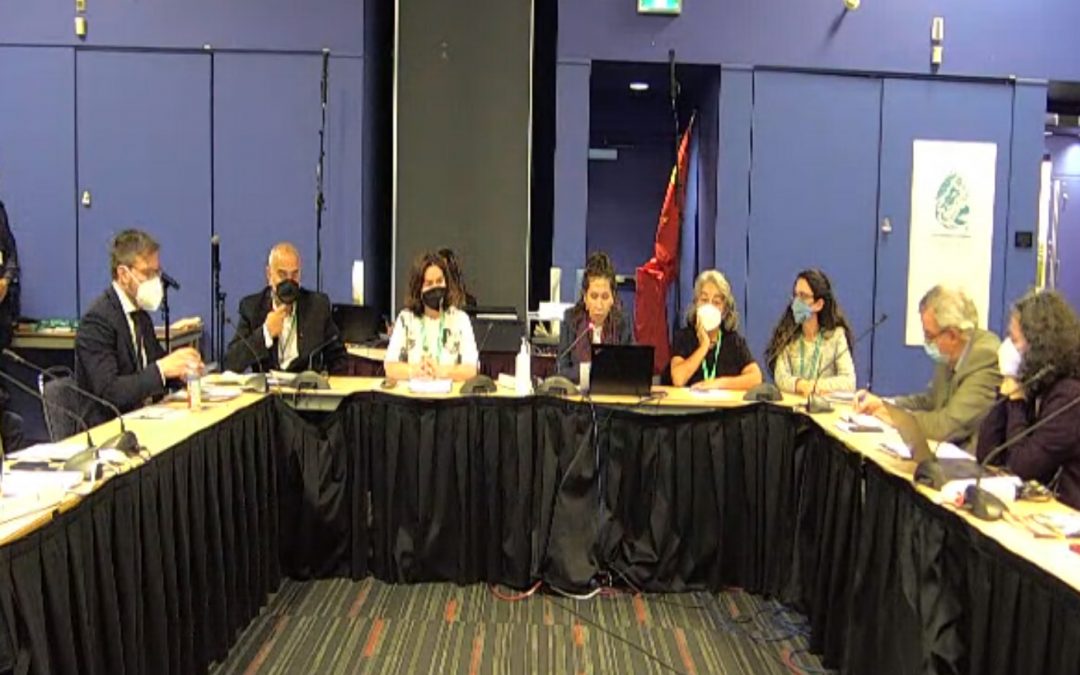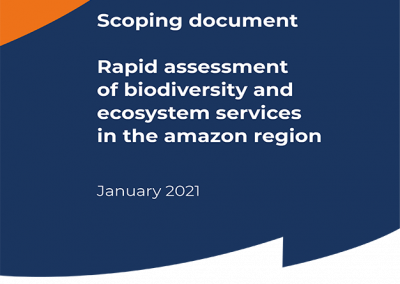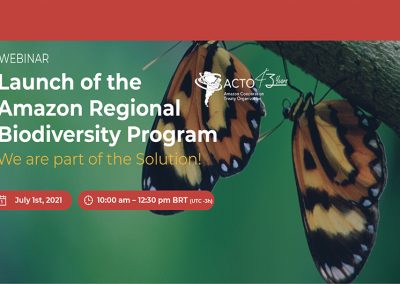ACTO Biomaz: Support to the ACTO biodiversity program under the CBD Framework in Latin America
Videos
Photos
More informations
Collaborate with us!
Invitation for External Experts to Comment on the Technical Document of the Rapid Assessment of Biological Diversity and Ecosystem Services in the Amazon Basin/Region
Rapid assessment of biodiversity and ecosystem services in the Amazon Region
This is a technical cooperation project funded by the German Federal Ministry for Economic Cooperation and Development (BMZ) and implemented by GIZ. The project provides support to the Permanent Secretariat of the Amazon Cooperation Treaty Organization (PS/ACTO) and its Member Countries in the development and adoption of an agreed strategic framework/regional program for the sustainable use and conservation of the biological diversity in the Amazon forest; reporting on the status and trends in biodiversity and ecosystem services in the Amazon region; as well as the dialogue and exchange of experiences between experts and managers from Member Countries, in particular with regard to regional biodiversity management approaches. Thus, the project supports ACTO Member Countries in the implementation of international agreements, in particular the Convention on Biological Diversity (CBD), the Paris Agreement on Climate and the 2030 Agenda.
Goals
ACTO Member Countries rely on a regional strategic framework for the coordinated management of biological diversity and ecosystem services in the Amazon region.
Background
The Amazon is home to the most extensive and continuous tropical rain forest in the world that endows the region with the largest biological diversity on the planet. It provides multiple functions and ecosystem services, which are crucial for the survival, welfare and development of the inhabitants of the Region and the Amazonian countries. The Amazon River is the most important source of fresh water in South America and plays a strategic role in the protection and regulation of the global climate. With a population of around 40 million inhabitants, the region is home to more than 400 indigenous peoples that hold traditional knowledge and a rich cultural diversity. In the Amazon Region, different challenges related to replicating and scaling up alternatives that promote its sustainable development remain to be addressed while considering the conservation of biological diversity, the sustainable use of its components and the fair and equitable sharing of the benefits resulting from the use of genetic resources. This is to be done under the framework of actions that will boost local economies, help reduce inequality gaps and improve the quality of life of its population. In this context, the Member Countries of the Amazon Cooperation Treaty Organization (ACTO) are collaborating on the construction of an information and knowledge base, as well as the development of coordination processes at the regional level in order to achieve the objectives of the Convention on Biological Diversity (CBD), taking into account the CBD post-2020 Global Biodiversity Framework negotiation process.
Output 1 is intended to provide a scientific analysis of the state of biological diversity and ecosystem services in the Amazon region under the methodology of IPBES (Intergovernmental Science-Policy Platform on Biodiversity and Ecosystem Services). Collaboration on the design of the study and the discussion of its findings will help the experts and managers of the Member Countries and the Permanent Secretariat of ACTO to identity potential actions and to develop a regional and ecosystem approach in conjunction with the implementation of training and capacity building actions.
Activities/Deliverables
- Scope Document for the Rapid Assessment of Biological Diversity and Ecosystem Services in the Amazon Region submitted to Member Countries.
- Report on the Rapid Assessment of Biological Diversity and Ecosystem Services in the Amazon Region submitted to Member Countries.
- Development of a communication and dissemination strategy regarding the findings from the Rapid Assessment of Biological Diversity and Ecosystem Services in the Amazon region.
- Rapid Assessment Report presented and disseminated in on-site and/or virtual events at regional and international level and on the OTCA Website.
The purpose of Output 2 is to provide learning experiences and concrete solutions for the management of biodiversity in the Amazon region based on the identification, collection and dissemination of best practices, concrete solutions and lessons learned from the management of biological diversity while taking into consideration the traditional knowledge held by indigenous peoples, local communities and other tribal communities. These experiences will be publicized and made available through dissemination channels and exchange formats through ACTO.
Activities/Deliverables
- Base document on the thematic areas, principles, criteria and/or indicators for the selection of best regional practices for the conservation of biological diversity and ecosystem services submitted to Member Countries.
- Comprehensive call for the submission of nominations and selection of best practices and concrete solutions.
- Nomination/selection of best practices for the management of biological diversity and ecosystem services by Member Countries and consolidation of the data collected.
- Dedicated area on the OTCA website for the dissemination of selected best practices.
- Hosting a Webinar for the dissemination of best practices and exchange of experiences among Member Countries.
Output 3 is intended to strengthen ACTO in its role of regional concertation and forum by enhancing coordination among its Member Countries for the adoption and implementation of strategic priority actions under the Regional Program on Biological Diversity for the Amazon Region. Training on policies and measures among Member Countries will be promoted and, in the context of the COVID-19 pandemic, more intensive use of digital formats will be tested. This exchange will also drive the adaptation/update of national strategies (including NBSAPs) with respect to the future Convention on Biological Diversity post-2020 Global Biodiversity Framework. The presentation of ACTO’s regional approach to biological diversity at international conferences will also be promoted.
Activities/Deliverables
- Adoption of a regional strategic framework for the coordinated management of biological diversity and ecosystem services in the Amazon region has been coordinated by the PS/ACTO and developed with the Member Countries.
- Management and implementation plan for regional strategic actions that are prioritized by Member Countries
- ACTO’s approach to biodiversity presented at 3 international conferences.
- Support actions, learning fora and exchange of adaptation/update experiences of national strategies (including NBSAPs) with respect to the goals under the Convention on Biological Diversity post-2020 Global Biodiversity Framework among Member Countries.
- A dialogue and exchange on approaches and actions for effective implementation with a gender perspective in order to contribute to achieving the objectives of the CBD in their national contexts.
- Scientific information is available on the state of biological diversity and environmental functions/ecosystem services/contributions of nature to people, their states, threats, opportunities, trends, and underlying causes of degradation according to the conceptual and methodological format of the Intergovernmental Science-Policy Platform on Biodiversity and Ecosystem Services (IPBES), and options for action and policies at the regional and national level.
- ACTO relies on and coordinates a network of scientific and technical experts at the Amazon Region level who collaborate on scientific analysis.
- Examples are available of best practices for the sustainable management of biological diversity and ecosystem services at the regional level of ACTO. These examples illustrate the added value of regional cooperation in the Amazon Region.
- ACTO has been strengthened in its role of regional concertation by enhancing coordination among its Member Countries for the implementation of a Regional Program on Biological Diversity for the Amazon Region.
Strategic partner: Alexander von Humboldt Biological Resources Research Institute
Publications
Photos
Videos
Project News

Final results of the Rapid Assessment of Biological Diversity and Ecosystem Services in the scope of the ACTO are presented to the Scientific Committee for endorsement
On April 27 and 28, 2023, a meeting was held with the members of the Scientific Committee to present the final results of the...

Invitation for external experts to comment on the summary for decision making document of the Rapid Assessment of Biological Diversity in the Amazon Basin
Invitation for external experts to comment on the summary for decision making document of the Rapid Assessment of Biological Diversity and...

ACTO holds a side event at COP 15: The global importance of the Amazon
As part of the 15th Conference of the Parties to the Convention on Biological Diversity (COP 15) in Montreal, Amazon Cooperation Treaty...

Invitation for External Experts to Comment on the Technical Document of the Rapid Assessment of Biological Diversity and Ecosystem Services in the Amazon Region
The Amazon Cooperation Treaty Organization (ACTO), through the BIOMAZ Project, makes available the Technical Document of the Rapid...
…













